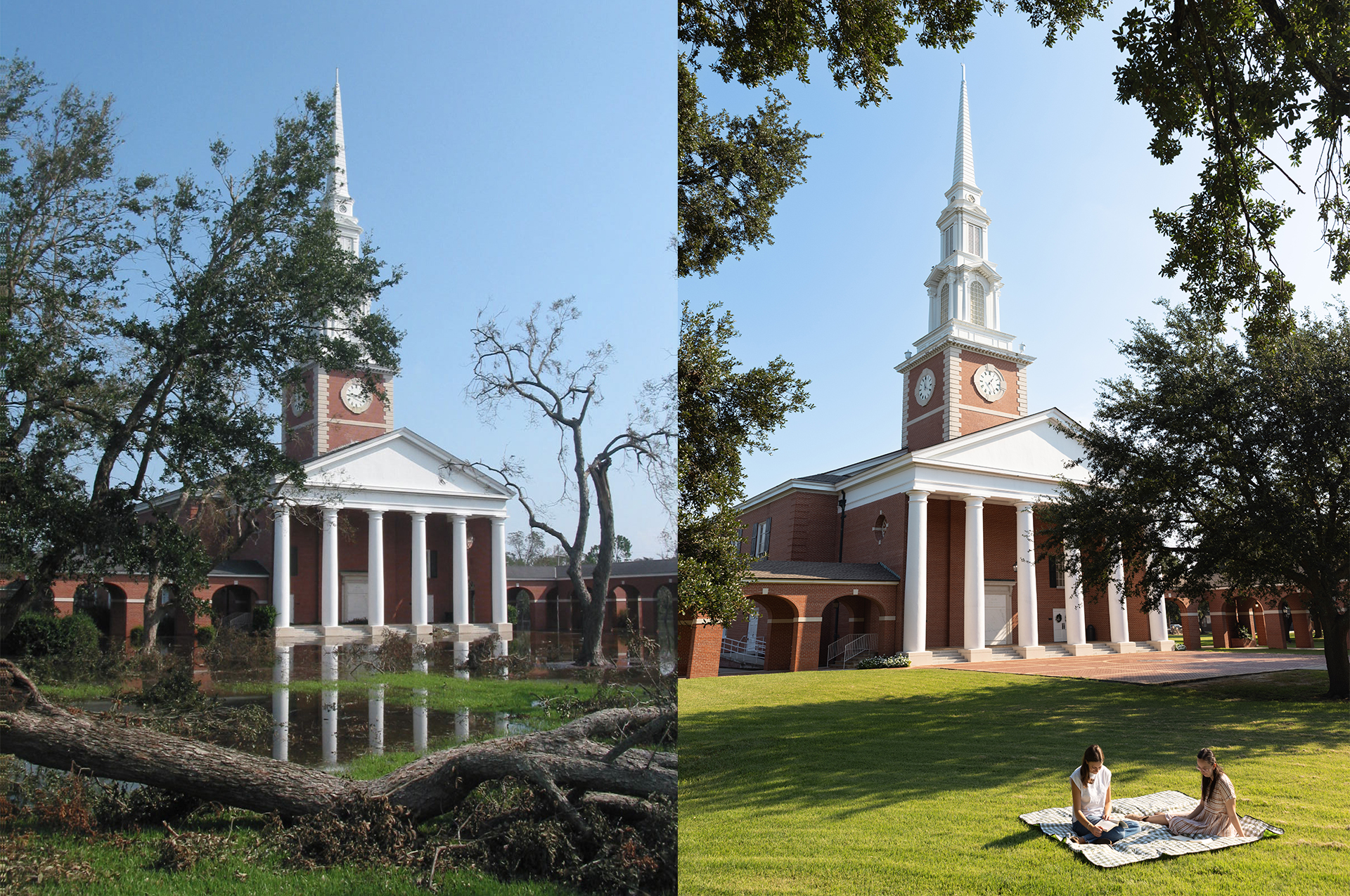
August 29th marks the 20th anniversary of Hurricane Katrina, the storm that forever changed the city of New Orleans and the Baptist Seminary which bears its name.
With an estimated death toll of more than 1,400, Hurricane Katrina became known as one of the deadliest hurricanes in U.S. history after it struck in 2005. The city of New Orleans became synonymous with Katrina and the lengthy recovery process that followed it.
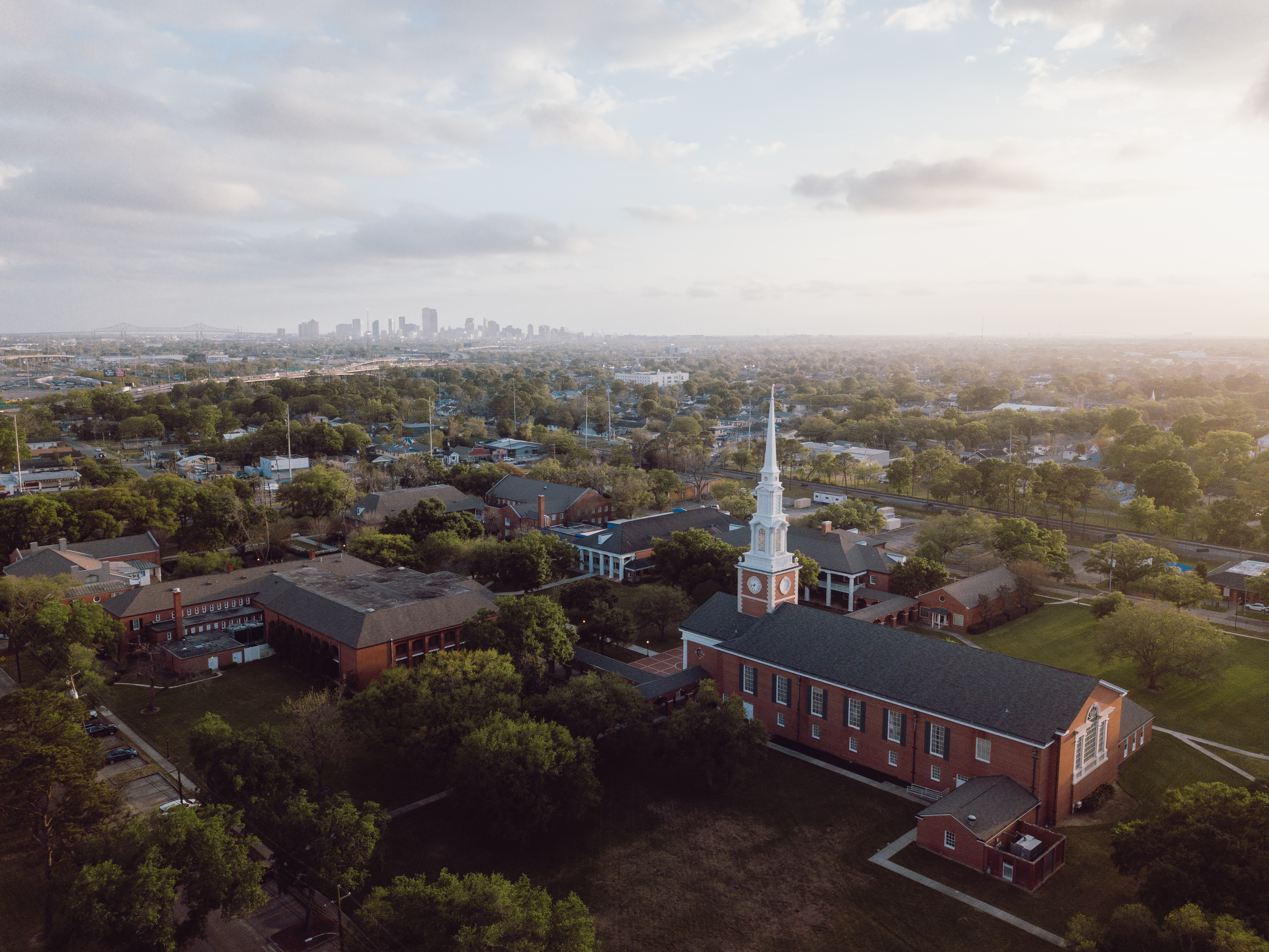
Despite the devastating impact of the infamous storm, New Orleans Baptist Theological Seminary and Leavell College remain a strong symbol of hope for the city and continue to carry out the mission Southern Baptists gave them more than 100 years ago.
Though NOBTS now experiences great success (marked by record fundraising numbers, thriving academic programs and growing enrollment), the seminary first had to endure intense trauma and heartbreak, millions of dollars’ worth of property damage and great uncertainty.
“Hurricane Katrina and its aftermath had a profound impact on the city of New Orleans and the campus of New Orleans Baptist Theological Seminary,” NOBTS President Jamie Dew said.
“I came to New Orleans after the storm when much had been done in terms of recovery in the city. And yet, an event like Katrina leaves long-lasting physical and emotional scars across the landscape of the city and her people.”
Dew said it was the grace of God that fueled the NOBTS family as they walked the long road of recovery.
“What I do know is this, in the time that I have lived in New Orleans and served NOBTS, I have witnessed time and again the people of NOBTS live out the reflection of our first President Byron Hoover DeMent when he said this place is a School of Providence and Prayer,” Dew said.
“God has been faithful and true to this institution by bringing her back healthier and more vibrant, by bringing her a people who desire nothing more than to take up the towel and the basin in service, and by giving us thousands of opportunities to proclaim the good news of the Kingdom.”
Coined by DeMent, NOBTS has long been known as the School of Providence and Prayer. It was those two things which carried the seminary through one of her defining moments to be where she is today.
The storm strikes
Just days before Hurricane Katrina would hit New Orleans on Monday, Aug. 29, residents assumed it would be just another storm.
Hurricane season in New Orleans typically lasts from June to November and natives are used to bunkering down and bracing for impact. But what followed in the days to come was unlike anything most people had ever seen before.
After Katrina changed its course and headed quickly toward New Orleans, NOBTS faculty and students began to evacuate the seminary campus during the weekend, with most only packing limited clothing and toiletries. The expectation was they would wait until the storm passed and return to their homes on campus in a few days.
Among the faculty who evacuated were some younger professors, such as Norris Grubbs and Preston Nix.
Grubbs, professor of New Testament and Greek, began teaching in 1999 while completing his Ph.D in New Testament and Greek.
Grubbs said the seminary calling for a mandatory evacuation was “pretty unusual,” but he still didn’t think too much of it.
Nix didn’t have to do as much packing as the rest of the evacuating faculty because he had just moved to NOBTS three weeks prior. Nix was leaving a pastorate in Oklahoma to become NOBTS professor of evangelism.
Still getting adjusted to campus, Nix had plans to move his prized library from his house to his office on Tuesday, Aug. 30. Those plans had to be put on hold, and Nix instead evacuated with his family on Saturday.
Instead of evacuating like the rest of the faculty, NOBTS President Chuck Kelley and his wife Rhonda were planning on staying in New Orleans through the storm until other members of the administration convinced him to evacuate just in case anything extremely impactful happened.
The Kelleys obliged and prepared to leave for Birmingham, Ala., but their concern immediately turned to Chuck’s parents, Charles and Doris Kelley.
Charles and Doris lived in Lambeth House, a 12-story senior living facility in Uptown New Orleans. Lambeth House was not planning to evacuate their residents for the storm, and the Kelleys were concerned that they were not going to be in the city if Doris and Charles needed help.
Vanee Daure, director of media services at NOBTS and one of Rhonda Kelley’s best friends, volunteered to stay back in New Orleans and assured Rhonda she would help her parents with whatever they needed.
Daure was born and raised in New Orleans. She had stayed in the city for several hurricanes over the years and planned to do the same even before needing to stay with the Kelleys.
However, her experience over the next several days would change her life.
After originally being hesitant to let her stay the night, Daure was asked by the leadership of Lambeth House if she would be willing to help with whatever was needed.
“I wouldn’t be here if I didn’t want to help,” Daure said in response.
Daure provided help by periodically checking on the Kelleys, helping feed other residents at the facility and moving residents from the top floor to the lower floors of the building.
The day Katrina hit, Monday Aug. 29, Daure assisted with moving all residents out of their rooms and into the hallway in order to be away from the windows.
Daure took an afternoon walk in the city after the storm passed. Other than some fallen trees and downed power lines, things didn’t look “that bad.”
The next morning, she woke up to a whooshing sound. It was vehicles towing boats into the city to collect people. She began to hear talk on the radio about water breaching the city’s levee system.
A short time later, the city issued a mandatory evacuation order.
Daure spoke with Lambeth House officials to assure that Doris and Charles would be evacuated together. Wondering where they should evacuate to and unable to reach the Kelleys, Daure called one of Chuck’s sisters, Dorothy Patterson.
Dorothy is the wife of Paige Patterson, then president of Southwestern Baptist Theological Seminary, and the oldest child of Charles and Doris Kelley. She asked Daure to drive the Kelleys out to Baton Rouge where they would have a friend meet them.
As Daure drove the Kelleys out of the city, the impact of the storm was already on display.
Daure describes sitting in traffic while leaving the city and seeing water begin to pile up on the opposite side of the interstate. Ambulances lined the side of the road entering the city for nearly a half mile. Helicopters were rescuing people from rooftops and dropping them off in a field next to the interstate.
“I remember looking back at all this and thinking, “My city is going to be different now,’” Daure said.
After arriving in Baton Rouge, Daure, along with Dorothy, learned only emergency planes were being cleared to land and take off in the area.
The two pivoted, and Daure agreed to drive the Kelleys to Lafayette, where they could fly out to Texas and meet members of their family. Upon arriving in Texas, a group from Southwestern Seminary was there to pick them up.
Their traumatic escape was over, but the seminary’s journey was only beginning.
A struggling, but surviving seminary
As NOBTS faculty and students were displaced all over the country, and even internationally, uncertainty lingered about the future of the seminary.
The damage to New Orleans and the NOBTS campus was already clear. The failure of the city’s levee system caused catastrophic amounts of flooding to engulf the Crescent City.
The seminary campus was among the areas completely flooded, with some sections of the property under 10 feet of water.
Students and faculty members watched as updates came in via news and satellite images. Everyone wondered what was next.
Kelley and the rest of the seminary’s administration gathered near Atlanta in the days following the storm with some important decisions to make.
Many people questioned if the seminary should take a semester break. Others simply wanted to know when they could return to their homes.
After Kelley and the seminary’s administration met for several days, they called for a faculty meeting at Southwestern Seminary.
The dinner meeting was a time to update the faculty about the campus and next steps. It was extremely emotional for everyone involved.
“We were all really glad to see each other,” Grubbs said.
“Plenty of churches and volunteers were helping all of us, but we all knew what each other were truly going through and what we had lost in a way that others didn’t.”
Pictures of campus confirmed what most faculty already thought, whatever was not taken from campus was essentially gone.
Kelley said as pictures of various faculty houses were shown during the meeting, families around the room began to burst into tears one by one.
“That meeting was one of the most difficult and emotional things that I have ever done,” Kelley said. “Two of the things that I told them during the meeting was that everything has changed, but God is going to see us through this.”
It was during this meeting that the administration announced they were planning to continue the semester, and they requested the various academic divisions to meet and determine what they would need to accomplish this.
After these meetings, it was decided the semester could continue in two weeks, and seminary staff began spreading the word to students. Birmingham was chosen as the site for December graduation only a couple months away.
“It was a super emotional meeting, but it was very much a message of stability, even though there were still a lot of questions,” Grubbs said.
“We all had questions about how we would do this, but at least now we had a path forward.
“It was a real searching time for everyone, but ultimately everybody was here at NOBTS because they felt called to be here. That was a big piece of it. If this is what we’re called to do and there’s still a way to do it, what else would we do?”
NOBTS was the only institution of higher education in New Orleans who did not take even a semester off.
Faculty and staff began to work feverishly to contact students in order to find out where they were and alert them that classes would continue.
Although still very spread out, many faculty and staff would work out of one of the seminary’s extension centers in Decatur, Ga.
To no one’s surprise, one of the folks contacting students and lending a helping hand around the extension center was Daure.
“You would just go in and you never knew what you were going to be doing that day,” she said.
“To this day I just try to help wherever it’s needed, and I think I got a lot of that from helping after Katrina. We just jumped in wherever we had to jump in.”
Meanwhile, the NOBTS IT department was hard at work preparing 40 new laptops for faculty members to use.
Grubbs explained that professors did whatever was necessary to keep their classes going, which meant online classes for many.
Grubbs developed all of his distance learning classes from scratch using his old notes and PowerPoint presentations.
Faculty members were forced into the world of online education, including Nix, who previously had little to no experience with technology.
Nix recalls writing down every keyboard command he needed to learn to operate his laptop.
Despite these challenging circumstances, Grubbs said the faculty rose to the occasion, and the Lord continued to sustain the seminary.
“The community of the seminary was still very strong, and the Lord continued to send us students,” Grubbs said. “God was faithful and gracious, even though it absolutely was a hard time.
“There have been a ton of things that NOBTS has overcome in its history, whether it be a disease outbreak or the Great Depression or many other things. It has been a story of struggle, but also of God’s providence as well.
“Katrina was a difficult part of the seminary’s story, but it was just one chapter in a story of more than 100 years of God being faithful. It was a reminder of how God’s plans are not always what we might expect, but they are bigger than we might expect too.”
Life, healing and Gospel hope
In addition to the academic challenges Katrina created, the emotional and spiritual challenges also loomed large for the NOBTS community.
Much of the pain stemmed from the trauma of being displaced from campus for nearly a year while it was rebuilt. People’s precious homes and cherished belongings were gone forever.
Unlike the academic aspect of recovery, there were no tangible steps that could be taken other than to pray and trust God.
The healing process started for many with a visit to campus the October after the storm. Facilities staff told campus residents they could have a few days to visit the seminary and collect any belongings that they could from their living spaces.
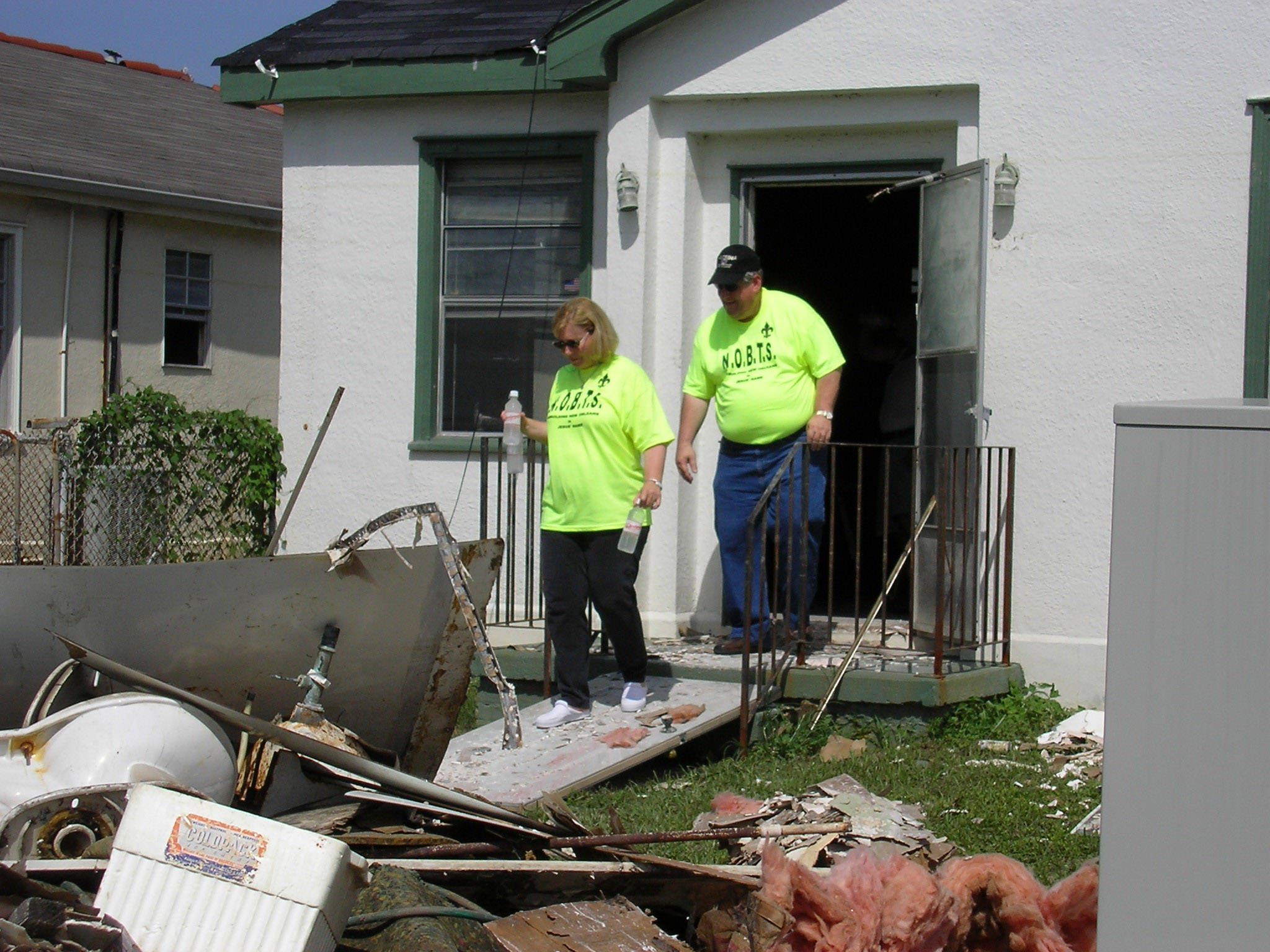
After these days, everything left in homes would be gutted and no one would be allowed back on campus until extensive renovations were finished.
Hopeful families returned to campus with pickup trucks and trailers, only to leave with a shoebox full of what could be salvaged from their former home.
Many faculty members experienced great pain and sorrow but held onto their love for the seminary as they patiently awaited their full return.
For Nix, his journey of healing looked very different from the rest of the faculty because he was brand new to the seminary.
“It was an exciting time when I originally came to NOBTS, but it was still a transition, and I was still trying to get my feet under me when Katrina hit,” Nix said.
“When we came back to salvage what we could in October, it was surreal. When we walked into our home and saw the devastation, it was really sad.”
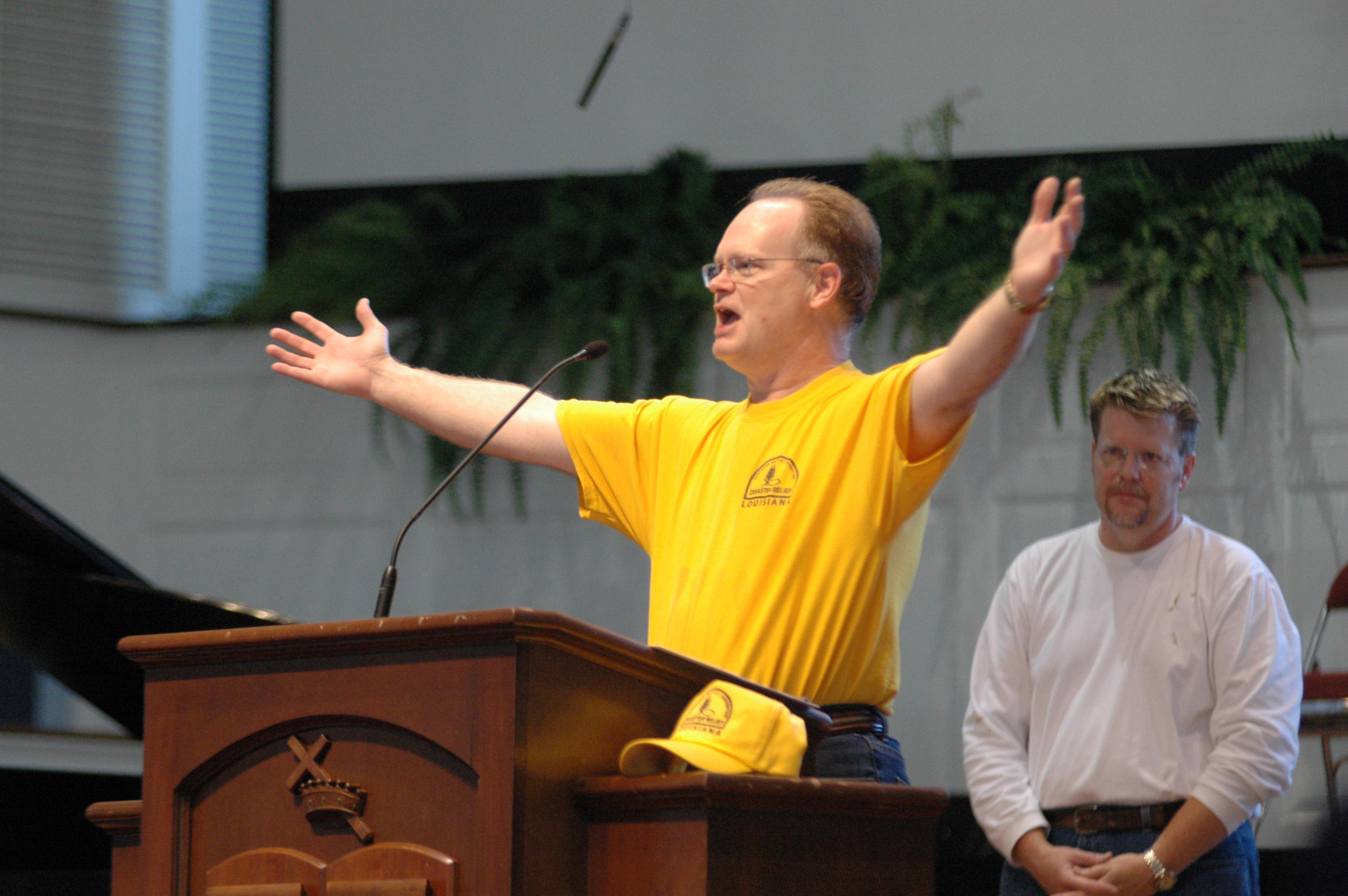 Nix lost his precious library, full of 30 years of sermon notes, signed books, translated verses and much more.
Nix lost his precious library, full of 30 years of sermon notes, signed books, translated verses and much more.
The current New Orleans climate and surrounding environment did not exactly help the mood of Nix and his family.
The intense flooding in the city had halted any vegetation growth. Coupled with a lack of people and power in the city, a dark and lifeless picture was on display.
“As we were leaving the city, we were looking around as the sun was going down and everything around us was covered in a grey ash color,” Nix said.
“There was no green, no birds, no noise, no nothing. It was death. That’s what it felt like. It felt like the city was dead. We were thinking, will it ever be able to come back again?”
Not only did Nix lose all of his belongings, but he barely had any connections to the rest of the seminary family to that point. Nix was so new that he also almost missed the meeting at Southwestern Seminary because he was accidentally left off the faculty contact list.
With little connection to the seminary and all of his possessions lost, many would logically ask why anyone in such a situation would return to that environment.
Nix admitted there were moments of struggle, but the Lord spoke to him in prayer to remind him of his calling.
He recalled one particular moment during worship at a church service shortly after the storm.
“For the first time as we were singing to the Lord there, I got upset,” Nix said. “I remember asking the Lord, 'Why did I have to lose my library? I had been accumulating those books and sermon notes for 30 years.’ Then I heard the voice of the Lord speak to my heart and say ‘Trust me.’”
This reminded Nix of his original call to join NOBTS, when he felt the Lord speak to his heart from a verse in Isaiah.
“I came back because God made it clear that this is where I am supposed to be,” Nix said.
“He gave me such a clear word from Isaiah after my second interview here. Even though we had been devasted and I had lost everything, God gave me a clear word that I should be here and that did not change when Katrina hit.”
Nix came back to do what he does best, serve and share the Gospel. After returning to campus, Nix led many campus groups and visiting disaster relief teams into the community to share the Gospel.
Through shared experience and the service of Southern Baptists, new doors began to open.
“People in this area had been through disaster together, and there was a greater connection and openness to the Gospel,” he said. “The Lord brought me back here to try to rebuild this city on the Gospel. There was death in the community, but we brought the life and hope of the Gospel.”
As people returned to campus and began to heal, another sign of life appeared as greenery slowly returned to the seminary, contrasting the darkness and death that once marked the city.
The School of Providence and Prayer 20 years later
20 years after Katrina, a lot has changed at the School of Providence and Prayer.
Homes and other campus buildings have been rebuilt. Campus locations have been renamed and remodeled. Many students currently living on campus were young children when the storm hit.
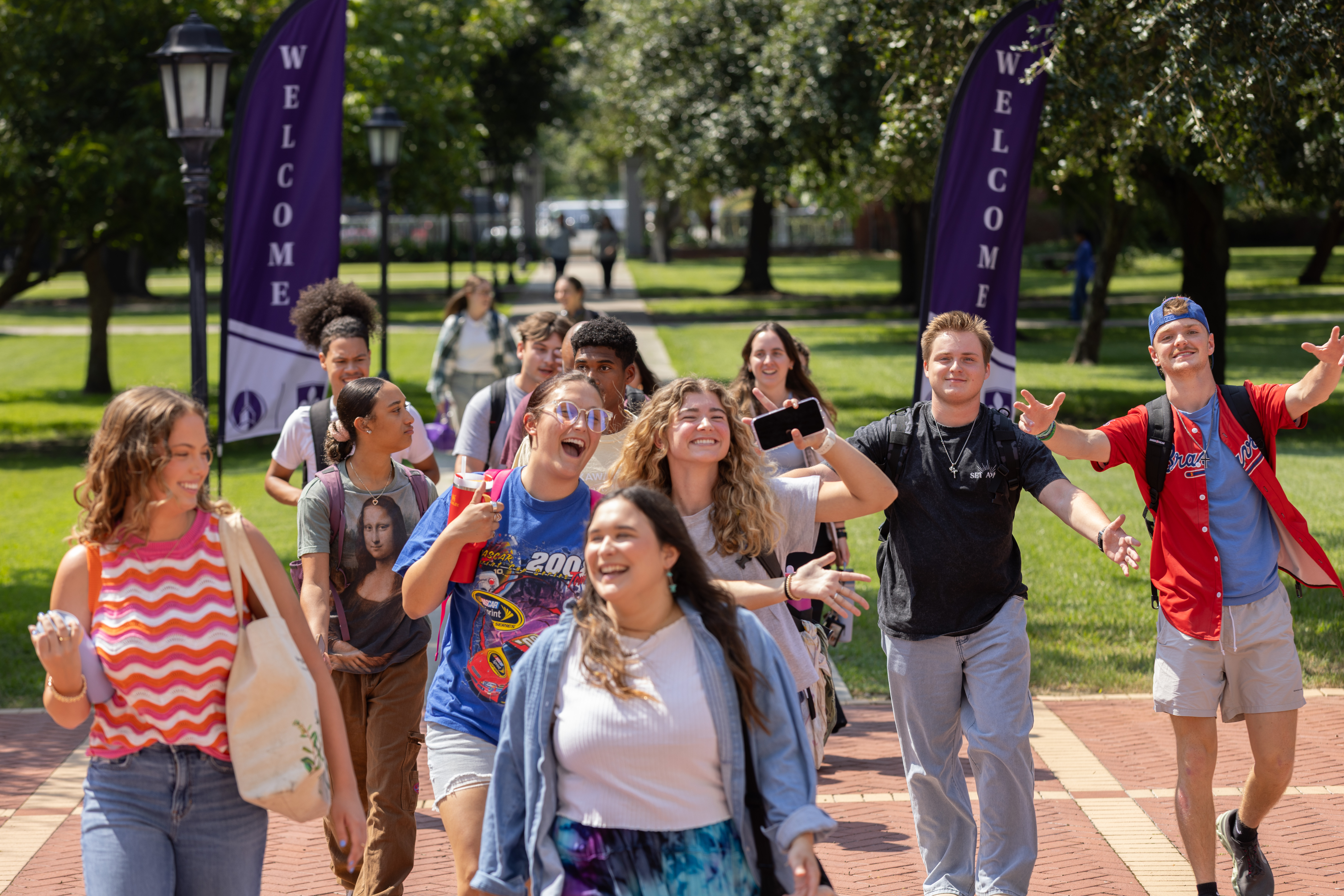 But those who endured Katrina and remain involved with the seminary today can especially see how far it’s come.
But those who endured Katrina and remain involved with the seminary today can especially see how far it’s come.
Kelley retired as NOBTS President in the spring of 2019 and transitioned to the role of president emeritus. In early 2025, Kelley delivered his first chapel message since retirement in which he chronicled his journey of grief after his beloved Rhonda passed away in Feb. 2024.
Daure continues to serve NOBTS, now as campus concierge. She continues to help the seminary in whatever way she can.
Seminary residents will often see her operating a camera during chapel services, serving lunch in the dining hall, offering directions to campus visitors, sitting courtside at intramural basketball games and having long talks with young students.
She frequently walks the same seminary streets once flooded with water. A picture of herself and Rhonda Kelley is displayed on her desk.
Grubbs now serves as NOBTS Provost and just celebrated his 25th year of teaching at the seminary. Instead of building online classes, Grubbs has instead led the way in rebuilding the seminary’s faculty.
Since Grubbs became Provost in 2017, 25 faculty members have retired (3 of whom still teach as ministry-based faculty) and 15 additional faculty members have left the seminary for various non-retirement reasons.
Grubbs led the way in hiring 32 new faculty members and led the faculty in welcoming a new president in Jamie Dew. These faculty have thrived academically and in personal relationships with students.
Nix still serves as professor of evangelism and evangelistic preaching and shares the same 20-year anniversary mark as Katrina. Once knowing nothing about computers, Nix has now designed several distance classes for the seminary. He continues to take students out into the New Orleans community to share the hope of the Gospel every week.
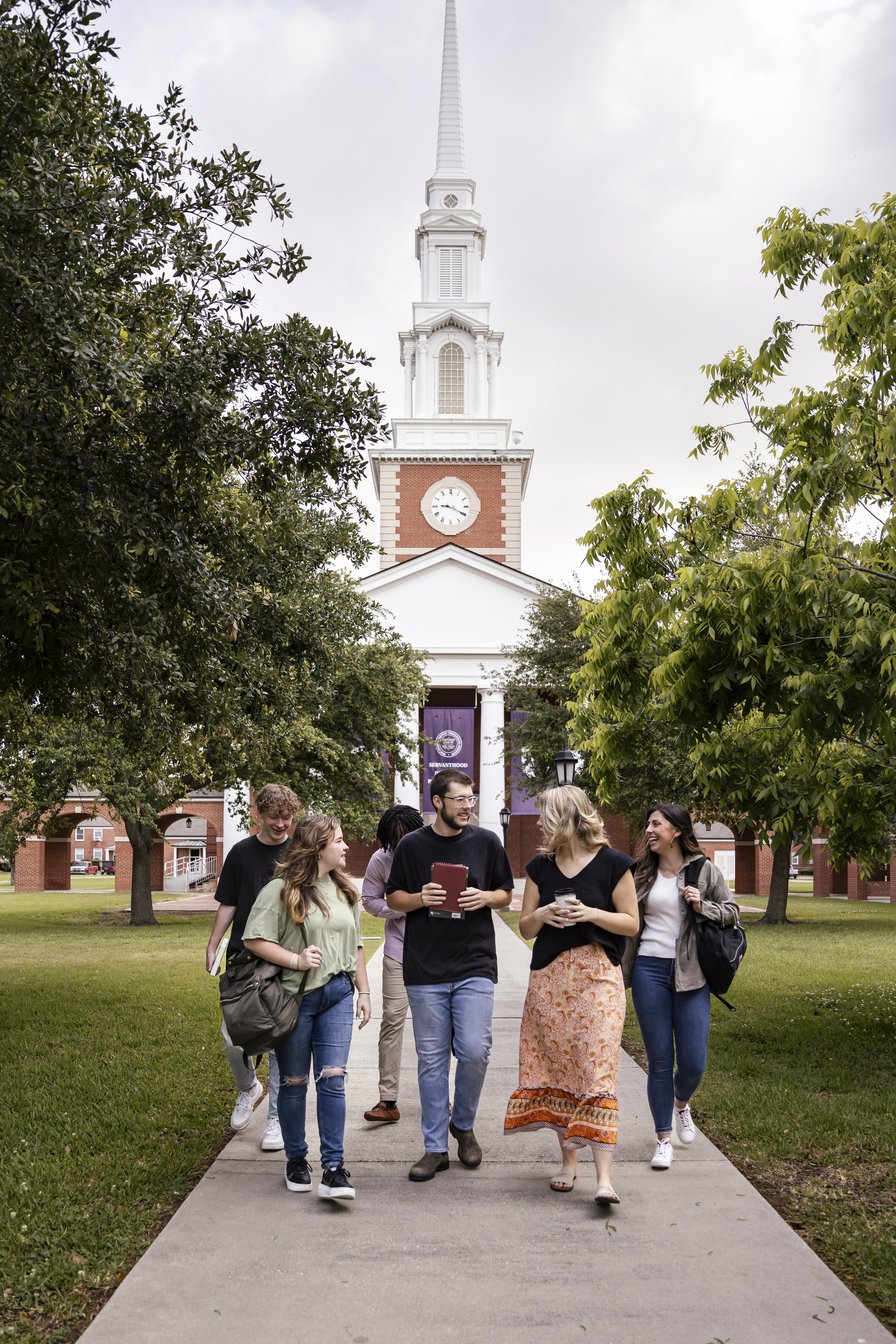
20 years later, the storm has been weathered, and NOBTS and her people remain. Although many present campus residents were not at the seminary for Katrina, those who did experience the devastation carry a legacy of redemption into the future.
“The history of this school has been one of tough challenges,” Dew told students during chapel on Tuesday, Aug. 26.
“God has again and again been faithful to his people at New Orleans Baptist Theological Seminary. Katrina nearly destroyed us, but it is now an Ebeneezer stone for us.
“We remember the storm and there’s still pain and sorrow associated with those memories, but yet, today we cannot think of those memories without seeing how God worked through it all.”
Tuesday’s service, as always, was held in Leavell Chapel. Lush grass and large trees filled with leaves surround the tallest building on the seminary’s campus.
These campus markers illustrate that NOBTS stands strong years after tragedy and trauma.
They symbolize what those first small patches of greenery on the remade campus represented; that life and ministry will continue at the School of Providence and Prayer.
“Katrina was a devastating storm by any standard, but as the psalmist reminds us, we are to be like a tree planted by the rivers of water, bringing forth her fruit in its season,” Dew said.
“May we be found ever faithful before God and vigilant in our work to proclaim the glory of our risen Savior whether in sorrow or in triumph.”